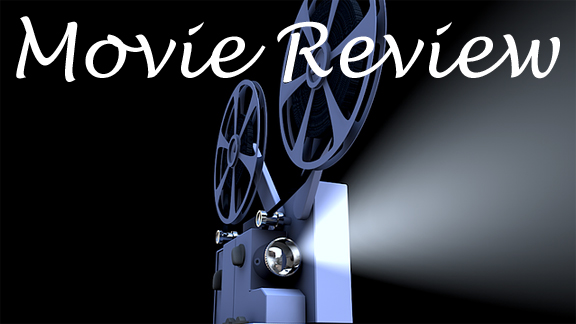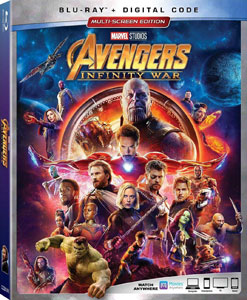This blog series chronicles my first viewing of the complete MCU movie saga. I’ll examine each film under various categories that reflect popular discussion points. Next up is the 19th film, “Avengers: Infinity War” (2018):
STRENGTHS
“Infinity War” has an epic scope, yet the steady pen of Christopher Markus and Stephen McFeely never loses sight of what these events mean to the characters. A theme gradually emerges as several characters must balance an individual’s worth versus the fate of all sentient-kind, and we feel the genuine stress of their dilemma.
We recognize that the fate of the galaxy is at stake (or “half” of the galaxy, since Thanos aims to kill precisely half of its citizens), yet the film serves up its share of chuckles – mostly courtesy of the Guardians of the Galaxy.

“Avengers: Infinity War” (2018)
Directors: Anthony Russo, Joe Russo
Writers: Christopher Markus, Stephen McFeely, Stan Lee
Stars: Robert Downey Jr., Chris Hemsworth, Mark Ruffalo
WEAKNESSES
The film is so big that some characters go unaddressed or under-addressed. A quick throwaway line reveals that Hawkeye and Ant-Man are under house arrest by the U.S. government (as per the events of “Captain America: Civil War”). As for the fates of Valkyrie and Korg, characters we grew to love in “Thor: Ragnarok?” Who knows? Either they were killed offscreen without mention or they escaped offscreen without mention. And while Thanos is certainly a big threat, he’s still a nutjob; the film tries but fails to give him a sympathetic side.
HEROES
In a film that services a couple dozen superheroes, many of them get nice little arcs but no one is the central hero. The most entertaining grouping is when Thor joins the Guardians of the Galaxy, leading to Star-Lord’s desperate and transparent attempts to put down the Asgardian and prop himself up. Later, some of the Guardians meet Iron Man, Spider-Man and Doctor Strange, again leading to a fun clash of dynamics.
The love story between Scarlet Witch and Vision comes into focus here, whereas Bruce’s ironic inability to let the Hulk come out is perhaps to be explored in future films. The character who most grows on me in this movie is War Machine, who admits regret at signing the Sokovia Accords and ends his communication with Secretary of State Ross by saying “Well, that’s a court martial,” before moving on to strategizing with the Avengers.
VILLAINS
Thanos (Josh Brolin) is literally big and holds the massive and terrifying ambition of gathering all six Infinity Stones, which will allow him to kill a random 50 percent of every species in the galaxy with a snap of his fingers. The gravitas given to his pronouncement that he must kill half of the citizenry lest everyone die from a resource shortage is a bit frustrating because it’s based on nothing except his emotional overreaction to what happened to his own planet. As Gamora tells him, reflecting my irritation: “You don’t know that!”

What happened to Titan will not necessarily happen everywhere, and furthermore, the Titan situation had to be more complicated than a resources versus population problem, since it seems to be a society capable of interstellar travel.
WOMEN
Remarkably, considering how big “Infinity War” is, it just barely passes the Bechdel Test due to women discussing Infinity Stones or exchanging battle insults — as when Natalie, Okoye and Scarlet Witch battle a female member of Thanos’ army.
MIRROR TO REALITY
“Infinity War” is a harsh indictment of world militaries and their governing structures, and in a broader sense, the notion of governmental regulation. How can that be when Earth militaries – other than that of Wakanda, which is directly targeted — play no role in the film? Well, that’s exactly the point: Their absence when Thanos’ army invades Earth illustrates that an independent superhero team (as per Captain America’s argument in “Civil War”) is crucial.
Free-thinking, free-acting superheroes are the first line of defense against an extraterrestrial threat with supernatural powers. The Sokovia Accords – had Cap agreed to them — would either go out the window in this situation, or they would stop the superheroes from doing their jobs, and Earth would be conquered. Governmental agencies’ best use is as supporting arms of the Avengers, although even then they can’t react fast enough to this threat: It’s not until Thanos achieves his ends that underground S.H.I.E.L.D. agents Fury and Hill even know he has invaded Wakanda.
BEST ACTION SCENE
This is ironic for me to say as a peaceful person, but it’s pretty freakin’ awesome when War Machine unleashes a string of bombs against Thanos’ marauding war beasts, which have breached the energy shield around Wakanda. Now that is military might well-spent.
BEST COMEDIC MOMENT
There are many to choose from in the initial interaction between the Guardians and Thor, but it’s actually a later Guardians scene that is absurdly funny. After Peter and Gamora share an emotional moment where he agrees to kill her if Thanos gets hold of her, they notice Drax has been standing right there – “for an hour,” he admits. But Drax says because he has mastered the art of being invisible, he can get away with it.
WORLD BUILDING
“Infinity War” isn’t about building the MCU world, but rather about paying off on the world-building done in the 18 previous films. For the first time, the disparate groups of heroes interact with each other. Someone coming into this film cold will have no chance of following what is going on or even figuring out who the characters are. In some cases, they aren’t even named. This is essentially a season finale in a serial TV show.
But there is one piece of new lore in the post-credits tag: Fury, as his dying act, places a call to Captain Marvel (as indicated by her logo, something that comic-book fans know about but the casual viewer might not). Why would he call her specifically? Does she alone possess a skill that could turn the tide of this war? We’ll find out in 2019 in her origin film and the “Infinity War” sequel.
FINAL THOUGHTS/EXPECTATIONS
“Infinity War” is a true epic, but for someone who has watched the previous 18 films, it’s not overwhelming, because we bring our background knowledge to the theater. Markus and McFeely smartly keep their eye on the ball – the characters, rather than the spectacle.
Despite that, it’s an unavoidable fact that no single hero is as much in the spotlight as in their solo films. I personally lean toward those intimate, smaller films. That and the unearned way nutjob villain Thanos is presented with an air of tragic gravitas keeps this movie short of full marks.

